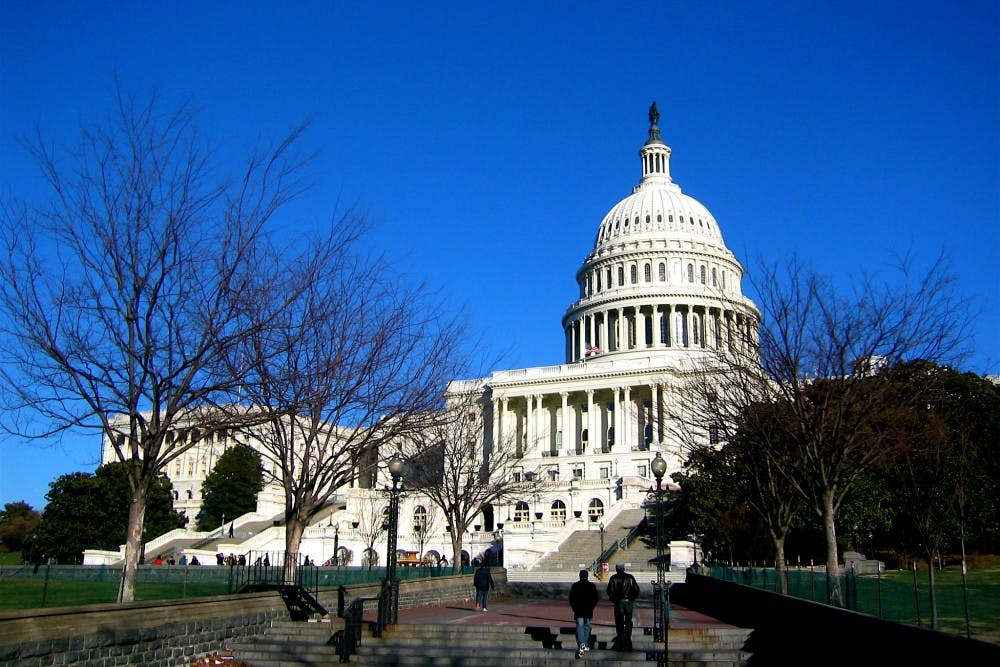
The House Committee on Ways and Means met to discuss the implications of free speech on campus and whether this would endanger nonprofit status for universities. // Courtesy of Elliott P./Creative Commons
On Tuesday, the House Committee on Ways and Means met to discuss free speech on college campuses.
The Congress Oversight Subcommittee is confronting the question of whether tax-exempt universities endanger their nonprofit status by allowing political activities on campus. Georgetown law student Alexander Atkins testified that he was repeatedly prevented from using school space and resources to support a Bernie Sanders campus group.
The Philadelphia-based Foundation for Individual Rights in Education’s Director of Litigation Catherine Sevcenko also testified. The organization, which was co-founded by Penn professor Alan Kors, has assisted in Atkins’ recent case in Georgetown.
Some congressional members worried that the question was not an issue for the Ways and Means Committee. “We have plenty of work to do, and this not it,” said Rep. John Lewis (D-Ga.).
According to FIRE’s Spotlight rating, Penn “nominally protect[s] free speech,” based on the organization’s analysis of university sexual harassment, open expression, student conduct, facilities use and electronic resource policies.
“It’s an issue that political groups experience on campus,” Penn Democrats President Max Levy said. He added that the Student Activities Council does not fund political events, and that funding typically comes from Penn Political Coalition’s separately-supported Synergy Committee.
He added that political groups can encounter difficulties when campaigning politicians are invited to speak. When booking large-scale rooms in the Wharton School, for instance, speakers have to be approved by the University.
Penn for Kasich founder Joe Kiernan said that political debate is necessary to the university student experience. While Penn for Kasich has yet to see any limitation of free expression on campus, Kiernan adds that a campus group support a more radical candidate like Donald Trump might have a “more trying” experience.
In her testimony, Sevcenko argued that challenges to student free speech rights is a national problem, and referenced cases of university political censorship at Catherine University and American University.
Sevcenko also said that the First Amendment applies differently to public and private universities. While state universities are government entities that are subject to free speech protections, private universities — depending on how they self-market — can also deal with questions of free association and breach of contract.
“It’s deeply ironic that the the university in an attempt to preserve their 501(c)(3) status are in fact censoring people, censoring students ... This is not a minor problem.” According to Sevcenko, 50 percent of the colleges and universities that FIRE analyzed had “openly unconstitutional speech codes.”
“As long as the IRS guidance is ambiguous, censorship will win out every time,” Sevcenko said. “Were the IRS to clarify that viewpoint neutral allocation of resources for political speech does not endanger an institution’s tax-exempt status, it would be a huge step forward.”
Princeton’s Open Campus Coalition co-founder Josh Zuckerman also spoke regarding recent attempts to require faculty cultural competency training and mandatory classes on what he called “so-called marginalized people” and affinity-housing. He said these programs create “university-sanctioned orthodoxies.”
The Daily Pennsylvanian is an independent, student-run newspaper. Please consider making a donation to support the coverage that shapes the University. Your generosity ensures a future of strong journalism at Penn.
DonatePlease note All comments are eligible for publication in The Daily Pennsylvanian.







